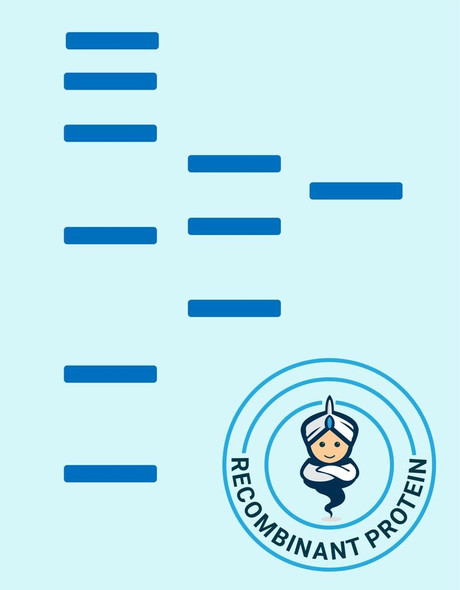Enzymes Recombinant Proteins
Human KLK15 Recombinant Protein (RPPB1876)
- SKU:
- RPPB1876
- Product Type:
- Recombinant Protein
- Species:
- Human
- Uniprot:
- Q9H2R5
- Research Area:
- Enzymes
Description
| Product Name: | Human KLK15 Recombinant Protein |
| Product Code: | RPPB1876 |
| Size: | 20µg |
| Species: | Human |
| Target: | KLK15 |
| Synonyms: | Kallikrein-related peptidase 15, ACO, HSRNASPH, Kallikrein-15, ACO protease, KLK15. |
| Source: | Escherichia Coli |
| Physical Appearance: | Sterile Filtered colorless solution. |
| Formulation: | The KLK15 solution (1mg/ml) contains 20mM Tris-HCl buffer (pH 8.0), 10% glycerol and 0.4M Urea. |
| Stability: | Store at 4°C if entire vial will be used within 2-4 weeks. Store, frozen at -20°C for longer periods of time. For long term storage it is recommended to add a carrier protein (0.1% HSA or BSA). Avoid multiple freeze-thaw cycles. |
| Purity: | Greater than 90% as determined by SDS-PAGE. |
| Amino Acid Sequence: | MGSSHHHHHH SSGLVPRGSH MGSLLEGDEC APHSQPWQVA LYERGRFNCG ASLISPHWVL SAAHCQSRFM RVRLGEHNLR KRDGPEQLRT TSRVIPHPRY EARSHRNDIM LLRLVQPARL NPQVRPAVLP TRCPHPGEAC VVSGWGLVSH NEPGTAGSPR SQVSLPDTLH CANISIISDT SCDKSYPGRL TNTMVCAGAE GRGAESCEGD SGGPLVCGGI LQGIVSWGDV PCDNTTKPGV YTKVCHYLEW IRETMKRN |
Kallikrein-15 (KLK15) is one of the 15 kallikrein subfamily members located in a cluster on chromosome 19. KLK15 contains numerous polyadenylation sites and alternative splicing results in multiple transcript variants encoding different isoforms. KLK15 is over expressed in prostate cancer and therefore uses as a diagnostic or prognostic marker for prostate cancer.
KLK15 Human Recombinant produced in E.coli is a single, non-glycosylated polypeptide chain containing 258 amino acids (22-256a.a) and having a molecular mass of 28.2kDa. KLK15 is fused to a 23 amino acid His-tag at N-terminus & purified by proprietary chromatographic techniques.
| UniProt Protein Function: | Protease whose physiological substrate is not yet known. |
| NCBI Summary: | Kallikreins are a subgroup of serine proteases having diverse physiological functions. Growing evidence suggests that many kallikreins are implicated in carcinogenesis and some have potential as novel cancer and other disease biomarkers. This gene is one of the fifteen kallikrein subfamily members located in a cluster on chromosome 19. In prostate cancer, this gene has increased expression, which indicates its possible use as a diagnostic or prognostic marker for prostate cancer. The gene contains multiple polyadenylation sites and alternative splicing results in multiple transcript variants encoding distinct isoforms. [provided by RefSeq, Jul 2008] |
| UniProt Code: | Q9H2R5 |
| NCBI GenInfo Identifier: | 18202940 |
| NCBI Gene ID: | 55554 |
| NCBI Accession: | Q9H2R5.1 |
| UniProt Secondary Accession: | Q9H2R5,Q15358, Q6ISI0, Q9H2R3, Q9H2R4, Q9H2R6, Q9HBG9 A0AUY8, |
| UniProt Related Accession: | Q9H2R5 |
| Molecular Weight: | |
| NCBI Full Name: | Kallikrein-15 |
| NCBI Synonym Full Names: | kallikrein related peptidase 15 |
| NCBI Official Symbol: | KLK15�� |
| NCBI Official Synonym Symbols: | ACO; HSRNASPH�� |
| NCBI Protein Information: | kallikrein-15 |
| UniProt Protein Name: | Kallikrein-15 |
| UniProt Synonym Protein Names: | ACO protease |
| Protein Family: | Kallikrein |
| UniProt Gene Name: | KLK15�� |






